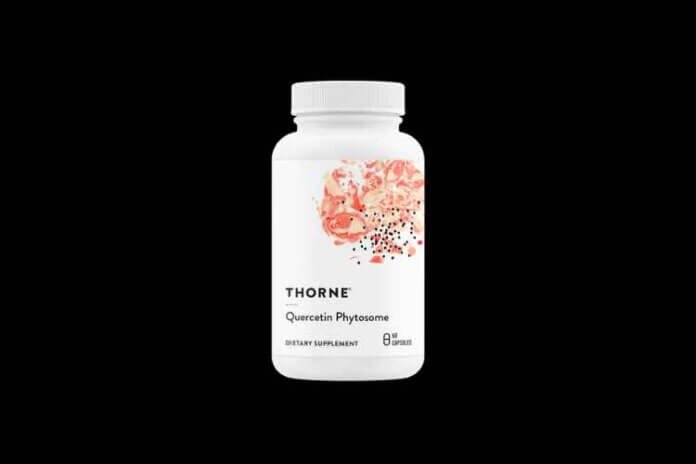
Quercetin is a flavonoid (a pigment that gives fruits, vegetables, and herbs their colors) that has antioxidant properties. It has many benefits and is often used to treat various health conditions. It seeks out damaging particles called free radicals in the body, neutralizes them, and prevents damage. It’s been shown to help prevent cancer, protect the heart, and even boost the immune system. It also reduces inflammation and c-reactive protein levels, elevated in diseases like diabetes, heart disease, and rheumatoid arthritis.
What is Quercetin?
Quercetin is a flavonoid (plant pigment) and antioxidant found in various fruits and vegetables. It’s a good source of vitamin C and has been shown to help protect the body from chronic diseases, including cancer and heart disease. It also helps regulate inflammation and oxidative stress, which can lead to many health problems. It also has anti-cancer properties and works to kill certain types of cancer cells (lung, prostate, breast, colon, skin, ovarian and cervical cancers). Quercetin from experts like Thorne.com contains a bioavailable form of quercetin encased in sunflower-sourced phospholipids to increase solubility. Quercetin is a natural antioxidant that scavenges harmful free radicals that cause cellular damage and accelerate aging. Its antioxidant activity makes it one of the most potent natural compounds to fight against aging and other chronic diseases. Animal studies it has been shown to reduce the occurrence of cancers and promote immune system function. It can also decrease the number of inflammatory chemicals in the body, such as histamine, which can cause allergic reactions and autoimmune conditions.
Antioxidant
Quercetin is an antioxidant that works to protect against oxidative stress and prevent chronic inflammation. It is found in many foods and can be absorbed through the digestive tract or taken as an oral supplement.
Its principal function is to reduce oxidative stress, which is when free radicals damage the body’s cells. These radicals can cause disease, as well as shorten your lifespan. As an antioxidant, quercetin increases the body’s glutathione (GSH) production. GSH is one of the most important antioxidant enzymes in the human body and helps metabolize oxygen free radicals into non-toxic hydrogen. Studies have shown that quercetin can reduce oxidative stress and help with heart health by protecting against atherosclerosis and inflammatory damage and preventing plaque buildup in the arteries. It also has anti-hypertensive effects, reducing the risk of high blood pressure. Another study suggests that it may have anti-cancer properties, too. This is because it can inhibit the growth of specific cancer cells, including breast, prostate, and ovarian cancers. However, more studies are needed before quercetin can be considered a cancer treatment. In the meantime, a healthy diet with plenty of fruits and vegetables that are rich in flavonoids can provide you with a daily dose of this critical compound.
Immune Supporter
Quercetin is an antioxidant and anti-inflammatory supplement that can be used for various health conditions, including allergic reactions, skin inflammation, autoimmune diseases, and cancer. It also helps fight infections and reduce oxidative stress. The primary way that quercetin works are by inhibiting the production of pro-inflammatory cytokines. These cytokines are produced by immune cells called mast cells, which can trigger an allergic reaction or other inflammatory diseases. This action prevents the release of inflammatory chemicals like histamine that cause symptoms such as runny nose, watery eyes, hives, and swelling. It also helps stop the symptoms of eczema and other skin conditions. Studies have shown that quercetin also has antiviral effects against Rhinovirus and meningoencephalitis virus, two viruses that can cause severe illnesses in humans. It inhibits the entry of the virus into the cell, preventing viral replication and decreasing the amount of RNA in the cells. Similarly, quercetin has been shown to bind and inhibit hemagglutinin protein (HA) subunits during influenza virus infection in cell models. This inhibits the formation of membrane fusion and the ability of the virus to cause hemolysis. These effects can make quercetin a good choice for several medical conditions, but more research is needed to understand its full therapeutic potential. In addition, it’s important to remember that there are many other factors you can do to help boost your immune system, such as eating well, staying active, and getting plenty of sleep.
Helps Prevent Allergies
Allergies come in many forms, from seasonal rhinitis to severe illnesses like asthma, eczema, and hives. Fortunately, there are plenty of natural options to help you manage your symptoms and prevent them from returning. Quercetin, a flavonoid antioxidant, is one such option. It inhibits the release of histamine from mast cells and basophils, which can help to relieve allergy symptoms like itchy eyes, throat, and sneezing. In addition to alleviating allergy symptoms, quercetin is also said to lower inflammation and promote immune health. It also helps to balance the body’s inflammatory response by improving T cell activity and suppressing interleukin (IL)-4 production.











